- About
- Visiting
- What’s On
- Venue hire
- Catalogues
- Collections
- 101 Treasures of Chetham’s
- Digital Resources
- The Flowers of Histories
- A Book of Hours from France
- The Manchester Scrapbook
- Thomas Barritt of Manchester
- Art Treasures Examiner of 1857
- Manchester Association for Constitutional Order
- The North Western Museum of Science and Industry: Some Reminiscences by Richard Hills
- Criminal Manchester
- The Cup of Destiny
- Athenaeum Souvenir
- Middle English Manuscripts
- Manchester and Liverpool of Today
- Hollingworth’s Mancuniensis
- Memoir of Cecil Wray
- William Seward’s Diary
- The Anti-Monopolist
- Fishwick’s History of Rochdale
- Knyvett’s Defence of this Realm
- Tractatus de Nigromantia
- Axon Ballads
- Printed Books & Ephemera
- Archives & Manuscripts
- Prints and Photographs
- Blog
- Support us
Hulme Trust Archive: Manchester through the ages
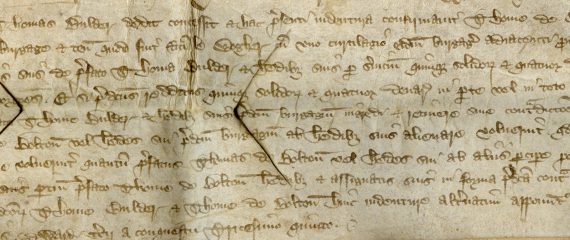
Thanks to a grant from the Hulme Trust in 2015, we’ve been working on cataloguing and conserving the substantial Hulme Trust Archive held at Chetham’s Library, to make it more accessible for future researchers and visitors. Now nearing completion, this three-year project has revealed the considerable scale and scope of the archive – much of which hasn’t been seen in a century or more.
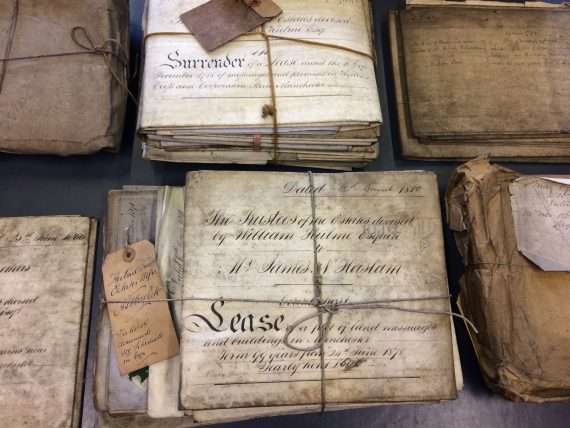
Bundles of deeds awaiting conservation.
The archive comprises the records of one of the oldest and most important charities in the North West of England, reaching back from 1969 to the thirteenth century.
The Hulme Charity was established with the will of William Hulme, a wealthy Lancashire landowner who died in 1691. Originally intended to support four poor scholars at Brasenose College in Oxford (where William may have been a student), the Hulme estates expanded rapidly in the eighteenth century and the Trust became a major benefactor to schools and parishes across the Greater Manchester region.
The collection runs to thousands of documents: property deeds, letters, plans, newspaper cuttings, school and parish pamphlets, and financial accounts. But its most significant contribution to Manchester’s history is its series of medieval and early modern deeds – land sales and other legal papers – which tell us something about the people and places of Manchester in its pre-industrial age.
The medieval Hulme deeds
Records and high-resolution images of these deeds can now be found via our new online catalogue for manuscripts and images – making them easily accessible to the public for the first time in their 700-year history.
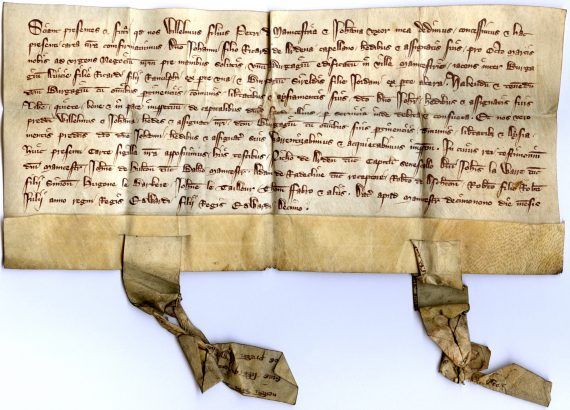
Grant of land in Manchester from William and Joan de Manchester to Sir John de Arden, 19 Jul 1316.
Unless you’re familiar with medieval documents, the deeds are difficult to read; the script is unfamiliar and many are written in Latin. But they are fascinating historical objects aside from their content, as rare survivals of Manchester’s middle ages. Some things you can tell without being able to read the script: the low-quality parchment and lack of decoration indicate that they were administrative documents, not decorative or precious; and details such as the personal seals (attached on tags) provide clues to the identities of the people represented, with the use of initials, family emblems, or puns on names – as with the surname Bridde (‘bird’) on the deed pictured below.
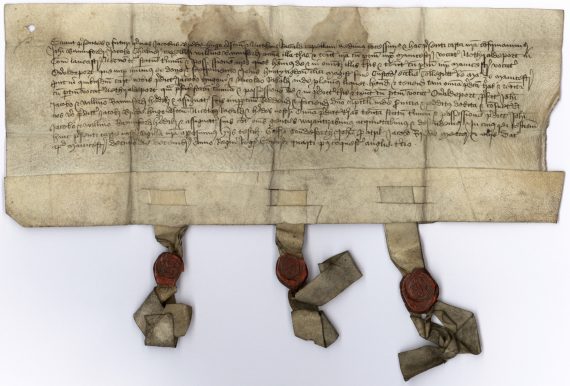
Deed dated 10 Dec 1463. From left to right, the seals are: a pelican (James Bridde), a letter A (Hugh Aston), a squirrel (Nicholas Ravald).
Huntingdon’s will
The most important medieval deeds in the Hulme Trust Archive are those relating to John Huntingdon. While he’s not such a familiar name now, John Huntingdon was once a prominent Manchester figure, as the first warden of the collegiate church (now Manchester Cathedral and Chetham’s Library) after it was established in 1421.
Much of what we know about Huntingdon comes from the Hulme Trust Archive. From his frequent appearances as a witness to land transactions between the local nobility and gentry, we can see that he made a place for himself at the heart of civic life. But these records don’t give much away about Huntingdon’s personal life, or how he felt about his time in Manchester. The most telling document, in this regard, is his will.
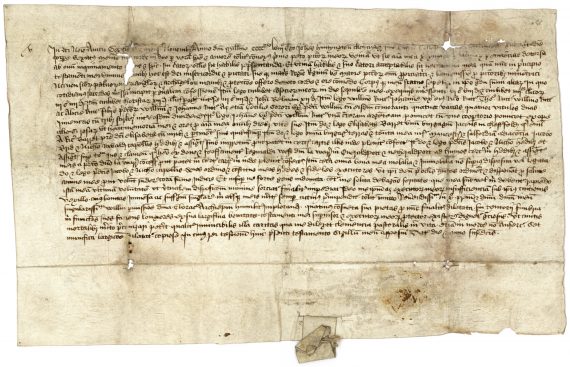
Huntingdon’s will, dated 7 Nov 1458.
Written only days before he died, Huntingdson’s will suggests that he’d had trouble from people in Manchester and feared that his wishes may not be carried out. Appealing to the Archbishop of York for help, he writes:
lest perchance an unbridled people, raging against me with their accustomed fierceness, by grasping at what belongs, or is owing to me, should prevent this my last will from finally effecting its intended purpose, I therefore place myself [under the protection of] my most singular good lord, William, by divine permission, Archbishop of York. [1]
Strong words! If only we knew exactly whom he had in mind…
Medieval archive for modern readers
The Hulme Trust Archive has been subject to very little research over the years, but we hope that by making it much more accessible, a new generation will be able to discover and enjoy its hidden histories.
If you’d like to help make the archive more user-friendly, by transcribing some of the medieval documents – or just to practise your palaeography skills! – you can start exploring the online images. If you’d prefer a PDF, or would like to submit your transcription for the online catalogue, please email a librarian.
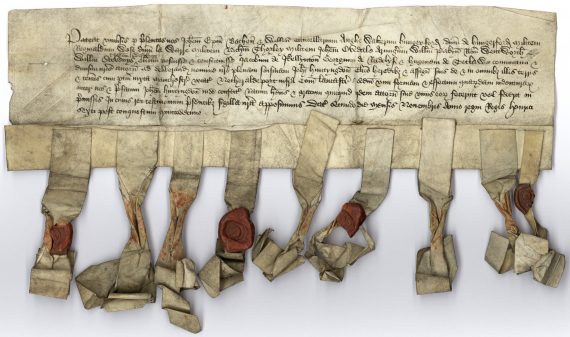
Grant of land in Manchester to John Huntingdon, 2 Nov 1436.
[1] J. P. Earwaker, who first listed the medieval deeds in the Hulme Trust Archive, also made a translation and brief study of Huntingdon’s deed in 1885. J.P. Earwaker, ‘The Will of Warden Huntingdon, 1458’, Transactions of the Lancashire and Cheshire Antiquarian Society, 3 (1885), 144–61,pp. 151–54.

3 Comments
Dr D R Mills
I have been recommended by Prof David Lemmings to consult Chetham’s Library in connection with some work that I am doing on Sir John Cheshire. I typed in his name and followed a link in the response to this point in your website. No more information about Sir John has appeared. He was a prominent lawyer in the period 1696-1738 and owner of an estate at Halton, now part of Runcorn. Perhaps you might be able to tell me if you have any records on his personal life and fortune. With thanks in anticipation.
ferguswilde
Dear Dr Mills,
Thanks for your enquiry, which we’ll answer by email. For the best results in your future use of the library, please use one of the email addresses to be found at http://library.chethams.com/about/contact-us/, as blog comments are not monitored daily.
Angela Lorenz
Thank you for posting these wonderful documents. I am curious about the way the double queue strips are attached to the folded flap at the bottom. Is it possible to see an image of the back of the documents? I am imagining that the parchments are cut ALL the way through, and that the strips are threaded through slits to the back of the document and then joined at the bottom with the wax seals. Thank you so much in advance for clarifying.